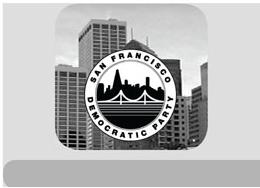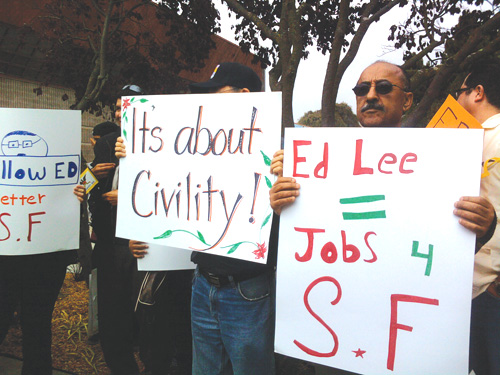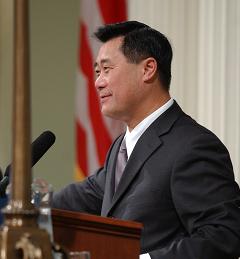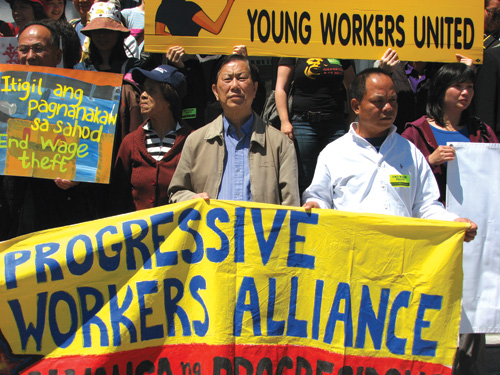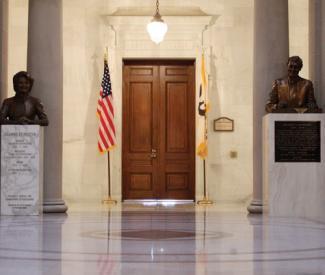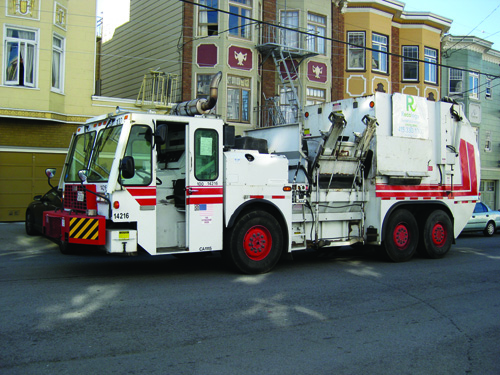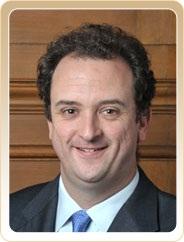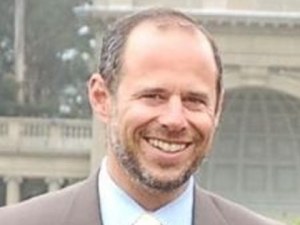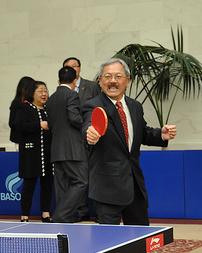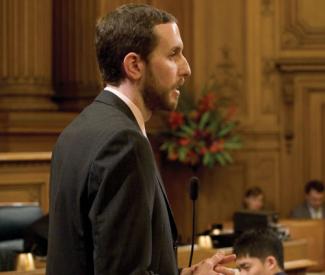Best of the Bay 2011 Editors Picks
Arts and Entertainment

BEST ‘PICKS OF PASSION
It is safe to say that Scott Weaver loves San Francisco. Leaving aside that Weaver’s family has called the City by the Bay home for three generations, the man has spent the majority of his life recreating the city’s charms with 100,000 toothpicks in an almost masochistically intricate behemoth he’s titled “Rolling Through the Bay.” The sculpture — which includes two tracks that vault rolling ping pong balls past landmarks like the 1929 Cliff House, Fleischhacker Pool, and Humphrey the whale — had its Exploratorium debut this year, stunning audiences with Weaver’s commitment to his craft. His regard for the skinny sticks is for real: the guy even had friends and family chucking ‘picks at his wedding. That’s love!
www.rollingthroughthebay.com
Though we appreciate the legions of pubs that rely on still shots and a good jukebox to entertain, we sometimes feel the need to broaden our drunken horizons with a good dose of drama. For those times, San Francisco Theater Pub is just the ticket. Chummily convened in the TenderNob’s low-key Café Royale, San Francisco Theater Pub has performed new translations of classic Greek dramas and staged adaptations of Lovecraft, Whitman, Alfred Jarry’s Ubu Roi, Evgeny Shvart’s The Dragon, and Vlacav Havel’s The Audience, as well as a series of San Francisco-themed shorts and a 75-minute version of Shakespeare’s Henry the IV and V — all against a backdrop of barstools, beer mugs, and bad lighting. Best of all, admission is free, so you can spend more on beer. Ah, the sweet, sweet hangover of dramaturgy.
At Café Royale, 800 Post, SF. (415) 441-4099, sftheaterpub.wordpress.com
Try as we might to hold to prudish societal lines, there’s simply nothing like telling a Really. Dirty. Story. (To a receptive group of friends.) Rejoice in your sluttiness, people! That’s the franchise line that Bawdy Storytelling creator Dixie De La Tour touts. Started as a recurring post-swinger’s night “kaffeeklatcsh for pervs,” around her kitchen table, De La Tour has grown Bawdy into a public, monthly, multicity storytelling event for kinksters and exhibitionists. Each edition has its own theme (polygamy, public sex, and SF-specific tales have all had their moments of glory); a cast of performers ranging from writers to pro pussy-petters; an occasional Grope-A-Clown box for intermission entertainment; and always, Dixie — to shout encouraging innuendos when the occasion arises.
www.bawdystorytelling.com
Since early January, when Chris Daly stepped down from the Board of Supervisors and took ownership of the Buck Tavern, a political realignment has made City Hall a far less welcoming place for progressives. So they’ve followed Daly over to his new digs (nicknamed Daly’s Dive) instantly transforming the Mid-Market bar into the seat of power for the progressive local government-in-exile: a place where revolutions are plotted and frustrations are soothed with strong drinks and juicy burgers. With SFGTV on the tube, Daly slinging classic cocktails and brewskis, and malcontents lining the bar, the Buck has become a refuge for leftist political junkies. And for those looking for shockingly clean bar bathrooms.
1655 Market, SF.(415) 874-9183
You can’t put Slough Feg’s Mike Scalzi in a tidy box. As front man of the cult local metal band — its most recent album, 2010’s The Animal Spirits, earned critical raves — he prowls the stage with a vaudevillian flair while performing blistering, melodious tunes (sample titles: “Trick the Vicar,” “Ask the Casket". Plus: he’s a sci-fi fan; he teaches philosophy at Diablo Valley College; and he occasionally pens highly articulate, commenter-rattling columns for respected metal blog Invisible Oranges. Slough Feg will play a rare show Aug. 17 at the Elbo Room, opening for New Wave of British heavy metal legends Diamond Head. Voices will soar; faces will melt.
www.sloughfeg.com
If you ever need reminding that nerd is still the new black, TechShop is at the ready. Inside this SoMa “open access public workshop” you’ll find a veritable wonderland of high-tech tools for metal- and wood-working, machining, fabric crafts, electronics, and robotics — with classes on how to use it all. Offerings range from entry-level courses on basic skills like soldering, laser-cutting, silk-screening, milling, and injection-molding, to pro-pushing seminars on the latest precision machining tools and high-tech design software. Individual memberships are a pricey, $100–$125 per month (less for students), but hey — at least you won’t have to buy your own 3-D scanner! Whether you have a skill you’re itching to hone, an invention you’d like to prototype, or a project you’re hoping to finalize, this shop’s capable crew will help you see it through.
926 Howard, SF. (415) 263-9161, www.techshop.ws/tssf

It’s easy to forget, with the advent of sleekly produced, four-story street art extravaganzas, that graffiti used to be the strictly illegal pursuit of brave-crazy iconoclasts hustling around with backpacks full of signed FedEx stickers and cans of Krylon. But thanks to the self-described “lizard people” behind Endless Canvas, the art of the throw up is still being honored. The Bay Area street-art blog is updated daily with the kinds of pieces that’ll never star in a Warholian post — from ground tags to the bubble letters of WIRE, to the small wheat paste gems of Bella Ciao’s roses and Esu’s proud female faces. The site’s documentation dedication is testament to the real glory of street art: reasserting our right to be seen in a world that prefers blank walls.
www.endlesscanvas.com
The goofy brainchild of professional juggler Thomas John, “The Lady on the Wall” turns the dry bones, childhood mystery of the fall of Humpty Dumpty into a convincingly hard-boiled puppet noir, where all the puppets are eggs and almost all of them come to a rotten end. John’s deadpan, pun-filled narration and his deft physical manipulation of the principal players make “Lady” the best-laid plot starring a farm-fresh, extra-large dozen in the Bay.
Performance runs are sporadic but well worth the watching and waiting. You can also catch John performing his combination clowning-and-juggling shows on the Center Stage at Fisherman’s Wharf, and root for him as a final contestant on America’s Got Talent. Plus he plays the glockenspiel? Pretty crackin’, if you ask us.
www.gigsalad.com/thomas_john
“Do you want to play?” challenges Nathaniel Justiniano, the artistic director of Naked Empire Bouffon Company, who invites performing artists and activists of all disciplines to explore their loonier selves during his hardcore Bouffon Intensive weekend workshops. Participants learn to tap into their physical and emotional “asymmetry” and exaggerate it, excavating the bouffon within and applying their inside-out personas to any performance situation. The resultant characters — bundles of twisted, giggling, homicidal urges who have an uncomfortable talent for honing in on the weaknesses of others — are, well, insanely entertaining. Justiniano, who trained in bouffonnerie at the Dell’Arte International School of Physical Theatre, believes these “groveling goblin prophets” are harbingers of essential truths whose very grotesqueness compels people to pay them heed.
www.nakedempirebouffon.com
Admit it. You’ve always wanted to run away to sea. But landlubbin’ reality just keeps on getting in the way. Still, those Captain Kidd fantasies won’t go gently, so isn’t it great that there’s a safe space to live out your water-logged fantasies in real swashbuckling style? On the first Saturday of the month, at the very end of Hyde Street Pier (a National Park Service sanctuary for historic boats) a diverse crowd of young buffs and old salts gather together for a spirited sing-along, the Sea Chantey Sing. The atmosphere is pretty wholesome overall, but still a convivial anarchy reigns supreme. Want to lead a chantey? Go ahead. Want to improvise a harmony line during the chorus? Do it. Want to take a break and tool around the meticulously-restored tall boat Balclutha where the sing is held, cup of hot cider in hand? Totally encouraged! It’s free. It’s fantastically fun. And this October it’ll be a tradition 30 years young.
First Saturdays of the month, 8 p.m., free, reservations required. The Balclutha, Hyde Street Pier, 2905 Hyde, SF. (415) 561-7171, www.nps.gov/safr/historyculture/chantey-sing
This year marks the end of We Players’ three-year collaboration with the National Parks Service on Alcatraz Island. The project showcased the island’s scenic isolation in a number of artistic and community-building endeavors. The stage company’s 2010 marathon production of Hamlet was a tour de force of site-specificity, taking actors and audiences all over the island, including areas normally off-limits to the public. In their imaginative stagings of Macbeth, Hamlet, and Iphigenia, as well as their ongoing art exhibitions for, by, and about incarcerated juveniles and adults, the Players highlight themes of isolation, incarceration, justice, and redemption. They wield their art as a catalyst rather than as nostalgic revival. Their Alcatraz residency ends in the fall. In 2012, it partners with the California Parks Service to stage The Odyssey on Angel Island.
www.weplayers.org

If San Francisco was one big dance floor, Bayonics would be its house band. Mission born-and-bred members Pedro Gomez and Jairo Vargas met through the salsa scene and the youth arts organization Loco Bloco (drummer Gomez, who joined the group when he was 12, is now its music director). The band incorporated the other sounds of the city: reggaeton, funk, old school Frisco hip-hop, reggae irie. Now with horns, timbales, and three emcees, it packs sweaty venues (and stages) with a diverse sound that could have only come from the Bay. A big band in the era of the iPhone DJ? With a new album, Mission Statement, dropping this summer, we bet there’s enough Bayonics love in this city to keep the party going.
www.bayonics.com
What kind of music do young ‘uns listen to nowadays? Cheesy Disney tweens? Justin Bieber? Kidz Bop? Start the culture-makers of tomorrow on the road to good taste today by taking them to venerable jazz club Yoshi’s — either the Oakland or San Francisco outpost — for the Yoshi’s Children’s Matinee. Certain Sunday early-evening shows offer a special admission rate of five bucks for kids, with a discount, usually $15–$18, for accompanying adults. And while the idea of children learning the finer points of free jazz and bebop makes sense — kids love to improvise — Yoshi’s calendar actually factors in just about every genre other than heavy metal (start your tyke down that road with a copy of Black Sabbath). Recent $5 matinees have featured Hawaiian guitarist Willie K., flamenco guitarist Ottmar Liebert, and vocalist Dee Dee Bridgewater’s tribute to Billie Holiday.
1330 Fillmore, SF. (415) 655-5600 and 510 Embarcadero West, Oakl. (510)238-9200, www.yoshis.com
Awash as it is in traffic-stopping murals and radical neighborhood galleries, the Mission hasn’t produced a lot of novels recently from its native sons and daughters. So when born-and-bred Missionite and City College literature professor Benjamin Bac Sierra‘s debut effort Barrio Bushido turned out to be a magical realistic, drug-and-violence-driven, sophisticated lyrical achievement, the ‘hood rejoiced in its son. Bac Sierra’s readings at Mission Cultural Center for Latino Arts turned out a capacity crowd, and a retinue of candy-painted, hydraulic-powered low-riders lined the curb outside. With Bac Sierra as a role model, maybe the barrio won’t have to wait long for another of its own to follow suit and publish something great.
todobododown.wordpress.com
The continued karaoke tyranny of Journey’s “Don’t Stop Believin'” induces revulsion on the order of Barney’s theme song. Now one fine man, maverick karaoke DJ Roger Niner, has taken a stand for all of us against the song’s monopoly. The wildly costumed, wildly fun Niner levies a $5 tax for its use, and uses the extra cash to buy more songs for his collection. Niner can usually be found at the Parlor near Fisherman’s Wharf on Wednesdays, San Mateo’s Swingin’ Door on Thursdays and Fridays, and SoMa’s Butter on Sundays. Ever the intellect, his website quotes Marcel Proust: “Detest bad music but do not despise it. As it is played, and especially sung, much more passionately than good music, it has much more than the latter been impregnated, little by little, with man’s tears.”
www.rogerniner.com
In 2010, Bay Area performance artist and provocateur Philip Huang bucked the notion of institutionalized artistic legitimacy and challenged his friends to stage performances in their own homes. “We can legitimize ourselves,” his manifesto promised, calling the welfare state of professional arts organizations a “crock of shit.” One year later, the all-volunteer, thoroughly-DIY Home Theatre Festival spanned the globe, with scheduled performances on four continents. The premise is simple: without paying hundreds of dollars to a venue for overhead expenses, artists can charge $8 at the door and still walk away with some profit, while audiences get to experience an intimately staged performance without an institutional filter. Whether home theater can or should replace all professional art space is up for debate, but it’s nice to be reminded that ultimately the art, not the venue, matters most.
philiphuangpresents.blogspot.com
Bouncer-for-hire Isaac is a towering figure in San Francisco, standing sentry at all of the top cultural happenings and cool club events. Simultaneously a welcoming presence and one who is not to be trifled with, he can be as cuddly as a teddy bear and as imposing as a grizzly. (Although he artfully and subtly conveys his grizzliness without feeling a need to menace or provoke.) Simply by being who he is — a big bearded guy in a loincloth who seems to know everyone — his presence validates the cultural cred of any event, and ensures you’ll find the entertainment you’re looking for therein. As a veteran performer with Fireside Storytelling, he may even provide some of it.

Imagine yourself traipsing through Golden Gate Park one sunny afternoon when the sound of the great Sylvester’s “Can’t Stop Dancing” tugs you by the ear toward the AIDS Memorial Grove. There you spy dozens of human butterflies, fluttering and whirling in the breeze as a DJ turns them out. Drawn by your fascination, you enter the fray, pick up a couple of psychedelic-patterned pieces of fabric, and begin to twirl with abandon. You’re floating with Flagging in the Park, the charitable monthly afternoon flood of queer love, put on by personal trainer Xavier Caylor and friends. Like fan-dancing, flagging (dancing with weighted pieces of fabric) is a decades-old gay dance floor tradition that has taken on a spiritual edge, calling up the memories of those affected by AIDS and drawing the blessing of our own spiritual godmothers, The Sisters of Perpetual Indulgence. It’s also simply fabulous.
Sat/30 and monthly, 1 p.m.–4 p.m., free (donation requested), AIDS Memorial Grove, Golden Gate Park, SF. Facebook: Flagging in the Park
The distortion burns. The reverb uncoils in snakey moans. And the rubbery bass and authoritative tom push forward, ever forward, in the hands of vocalist-bassist Shaun Durkan, guitarist Kevin Johnson, and drummer Abe Pedroza of Weekend. Formed just a year after the shoegaze pioneers of My Bloody Valentine made their way to San Francisco once more to play the hulking and reverberant Concourse, Weekend’s three unassuming childhood friends have managed to reform that cavernous shoegaze sound into something closely held and intimate, yet sweeping in its reach and tremulous with contemporary possibilities. The threesome’s first full-length album Sports (Slumberland, 2010), droned like 1990s post-punk yesterday once more — careening like a loud, unforgettable dream. End times have rarely sounded so breezy, so good.
www.myspace.com/weekendmusic
Gone are the days when poetry readings were confined to the dimly lit coffee shops, public libraries and beat bars of urbania. San Francisco being one of the world’s meccas for all things literary, we word-worshipping denizens hardly bat an eyelash when we hear of something like the regular poetry readings at Tony Serra’s law offices on Pier Five. Serra, who has made a career defending and championing society’s outcasts by expressing “the poetry of the law,” has been holding such events for three years, usually with a theme attached and a lively crowd attending. This year included poetry events celebrating Native American culture and the great, lost deserts of America.
506 Broadway, SF. (415) 986-5591, www.pier5law.com/j-tony-serra
The Byrds drawled it best: So you wanna be a rock ‘n’ roll star? Then listen now, to what I say. Thanks Jim McGuinn, we’ll take it from here. Or rather, Blue Bear School of Music’s band workshops will. The school sets groups of about seven beginner-level musicians to practice cover songs (genres range from rock to country) for three months with a very patient teacher before they perform at Café Du Nord or Bottom of the Hill. Just don’t let it go to your head. Back to McGuinn: the money, the fame, and the public acclaim. Don’t forget what you are, you’re a star.
Building D, Fort Mason Center, SF. (415) 673-3600, www.bluebearmusic.org
Does growing up in San Francisco make you an insider in its art scene? Definitely not — but it can be fertile ground for creating a scene of one’s own. Sixth Street resident and Filipino immigrant Reynaldo Cayetano Jr.’s passion for film photography led him to convene Inks of Truth, an art collective of young City College students and SF natives. The group has thrown packed multimedia art openings with live local hip-hop soundtracks all along Sixth Street — Rancho Parnassus, the House Kombucha factory, and Bayanihan Community Center. This year, group members got the keys to DA Arts, the one-time SF district attorney’s office, whose walls they have lined with stunning black and white photography of life on Sixth Street.
DA Arts, 135 Sixth St., SF. www.wix.com/purposebeyondreach/inksoftruth

“Dark is the new light!” raves one online fan of San Francisco bleak-star rockers the Soft Moon. Outfit leader Luis Vasquez does double duty on conga and synth in Oakland-SF band, the Lumerians, weaving a sparkling, seething thread of exotica into that combo’s tropi-psych mind-meld. But the Soft Moon is where Vasquez chooses to tread darkly, venturing into an extremely chilled, vaguely menacing, yet exquisitely goth-derived and highly synthesized future. Rest assured, the way comes black-iced with ’80s-era shivers and intimations of Krautrock. Armed live with driving beats, bat cave echoes, and stabbing black-and-white visuals, Vasquez and Co. are the Bay’s prime entries in the “darkwave” wave that’s been sweeping underground dance floors. The Soft Moon released its self-titled debut on Captured Tracks in 2010. Next stop — your shattered earbuds.
www.myspace.com/thesoftmoon
This year, in the interest of a more sustainable diet, Mark Zuckerberg started only eating animals he personally killed. Sure, Zuck can afford to slay a steer or 20, but he raises interesting questions about our individual consumption patterns. The expanding Bicycle Music Festival has been experimenting in this very concept as it relates to the live music fest. This year a free all-day, all-night outdoors affair featuring more than 12 bands and performing groups took place in two different city locations — with a three-piece band and opera singers performing while the entire festival biked from one site to the other. Powered by volunteers on generator-bikes — which occasionally lost their charge — attendees learned a lot about party-time energy costs.
www.bicyclemusicfestival.com
This could also be titled “worst place to go after you ingest hallucinogens,” but hell, don’t blame Playland-Not-At-The-Beach for its slightly creepy-carny vibe. Blame the former first lady of San Francisco’s seaside: Laughing Sal, the legendary Playland attraction with the unforgettable ghoulish guffaw. A version of Sal keeps her eye on the joint, which is tucked into an unassuming El Cerrito building concealing a stuffed-to-the-gills treasure trove of Playland history. Other attractions include side show and circus artwork, modern pinball machines, and some incredibly elaborate dioramas — everything from a frosty, candy-laden “Santa’s Village” to the awesome “Dark Mystery,” featuring a zombie scene and a cows ‘n’ aliens vignette.
10979 San Pablo, El Cerrito. (510) 592-3002, www.playland-not-at-the-beach.org
From sand tapestries to cupcake cars, soap-making to 70-foot sculptures of spinning stone and steel, Make Magazine’s Maker Faire proves that people can make some cra-zay shit when they’re given the proper encouragement and place to show it off (and warehouse space). The event has gained a reputation for being like Burning Man — only with less dust and fun fur. This year, it featured the work of more than 600 makers, rendering the San Mateo County Event Center into a hand-woven, hydraulic-powered, homegrown healthy bacteria-sprouting maze of maker magic. The fair was also celebrating its fifth year in action (the East Bay edition of the fair takes place Oct. 16 in Oakland), having already turned on thousands to the joys of tinkering.
www.makerfaire.com
If bikes are ever going to live up to their potential as game-changers in the world’s consumption of fossil fuels, their proponents are gonna need smarts, heart, and damn if they’re not gonna need style as well. Luckily, Tyrone “Baybe Champ” Stevenson Jr. has all three covered. The Oakland cyclist started decorating his two-wheelers with flashy strips of foil, elaborate sound systems, and kitschy corporate logos, sparking a movement that now claims a hip-hop video with more than 3 million hits on YouTube, a dedicated East Bay youth massive, and a world of imitators. The Original Scraper Bike Team holds head-turning single-file group rides through its neighborhoods and has become a bike advocate on par with few. Broke environmentalists everywhere can jam with OSBT anthem: “My bike rides/<0x2009>Don’t need no car.”
originalscraperbikes.blogspot.com
Hey Lil B, we don’t get you — which is crazy because you’re blowing up our Twitter feeds, clogging YouTube with your endless mixtapes and party tracks, and inspiring kitchen dances and gratuitous catchphrases (#swag, #based, #rare) — or rather, repetitious outbursts you insert into your hooks and tag all over aforementioned feeds like there’s no tomorrow. You’d think we’d all have the material necessary to formulate a theory, or something. But then we listen to your 2010 album Rain in England, whose songs lay your spoken word ruminations on dreams and feminine beauty over soothing ambient aural waves. Don’t even get us started with this year’s I’m Gay album-brouhaha. And you’re from Berkeley? #Complex.
www.basedworld.com
Smiths-mania is an admirable torment that afflicts any teen worth her salt who craves morosely literate lyrics paired with driving, jangly melodies. It can continue to affect its victims well into adulthood, too — from nostalgic Gen-Xers who slip on Meat is Murder when the sky is gray and the black dog is growling softly, to folks like author Simon Goddard, whose Mozipedia meticulously breaks down the particulars of every song the 1980s British group recorded. Another work of genius that a feverish Smiths obsession has engendered? Janice Whaley’s The Smiths Project. The Bay Area singer produced a six-CD, 71-song a cappella recreation of the melancholic Mancunians’ entire catalog — in one year. The ingeniously layered beauty of Whaley’s voice fills in all the parts of classics like “How Soon is Now” and “The Queen is Dead.” But all the ache of the originals remains.
thesmithsproject.blogspot.com
San Francisco is a global center of house and techno, and despite lacking the vibrantly extra-legal underground scene of other cities like Berlin, Philadelphia, or (closer to home) Oakland, it has always retained a handful of winning clubs that could host a killer party or two. But in the past five years, there’s been an explosion of dance music output — and dance music interest. Today there are just as many in-demand DJs as there are touring indie bands. For a while it seemed as if San Francisco wouldn’t be able to handle the flood, providing the required sound quality (expensive) at the right door price (affordable), while shunning annoying VIP vibes. So when a number of longtime nightlife freaks got together and opened a space last year with the right raw feel, kickass sound system (state-of-the-art Funktion One), and dedication to the funds-challenged community, San Franciscans breathed easy and got sweaty. The consistently stellar lineups and innovative charitable programming at Public Works has polished our little stop on the worldwide party train. Toot toot!
161 Erie, SF. (415) 932-0955, www.publicsf.com
We couldn’t pass it around fast enough. Rebecca Solnit’s Infinities Cities, the SF intellectual’s cartographic wonderpiece of Bay Area history and emotion, swept a large part of the Guardian staff off our feet, so pleased were we by its 22 out-of-the-box renderings of the hills and valleys we work and play on. Sites of gay struggle superimposed with the natural habitats of butterflies; a comparison of how identities shift (in this case, Solnit’s and Mission District performance artist Guillermo Gomez Peña’s) between neighborhoods like Pac Heights and the Sunset — a city can’t be defined by Muni maps alone. Solnit’s book, which features deeply researched essays to accompany each map, showed us new roads toward understanding the Bay Area.
www.rebeccasolnit.com

